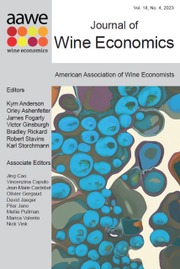Article contents
Collective Economic Conceptualization of Cider and Wine Routes by Stakeholders
Published online by Cambridge University Press: 13 November 2019
Abstract
The coherence and systemic strength of the collaborative process among thematic route stakeholders are key factors to economic success for individual businesses and regional economic development. The objective of this article is to identify the economic action set to rejuvenate the Cider Route and the Wine Route of the Montérégie region (Quebec, Canada). Group concept mapping is used to estimate the conceptualization and perceptions of stakeholders (cideries, wineries, tourism professionals, visitors) regarding the articulation of the action set. The contribution is threefold. Methodologically, the approach taken supports both the estimation of the concept map and associated perception measures. Empirically, eight action clusters are identified to articulate stakeholders’ “organizational” and “selling” dimensions of the routes. Practically, action priorities identified and feasibility constraints are helpful to target the capability development support needed by route stakeholders to collaborate. (JEL Classifications: D02, L23, L26, L66, Q18)
- Type
- Articles
- Information
- Copyright
- Copyright © American Association of Wine Economists 2019
Footnotes
The authors would like to thank participants at the 2019 AAWE annual conference in Vienna and journal reviewers for helpful comments. The authors thank winemakers, cidermakers, and tourism professionals for participating at various research steps. The financial and logistical support of Tourisme Montérégie and of Chaire de Tourisme Transat (University of Quebec at Montréal) are gratefully acknowledged.
References
- 7
- Cited by


